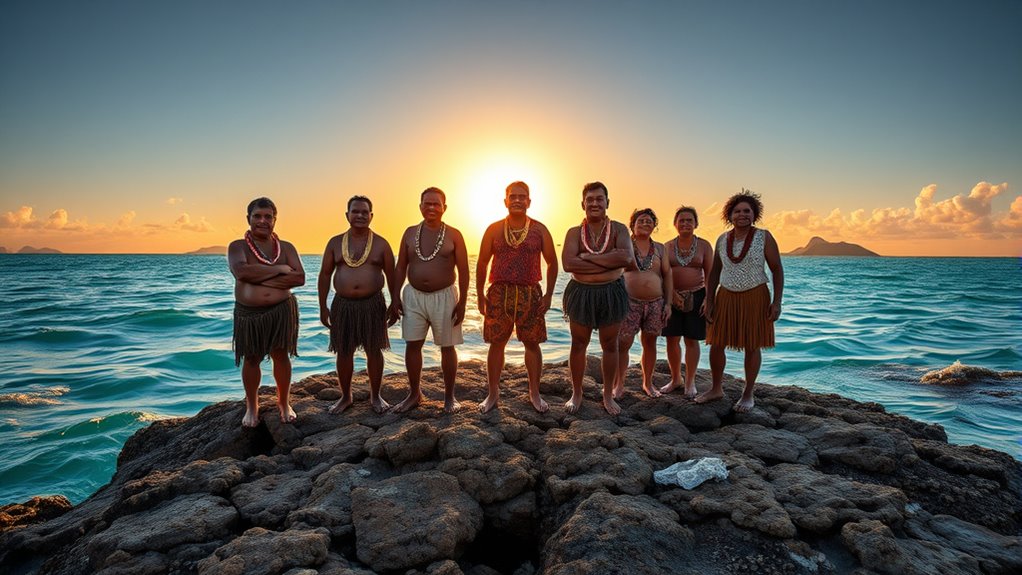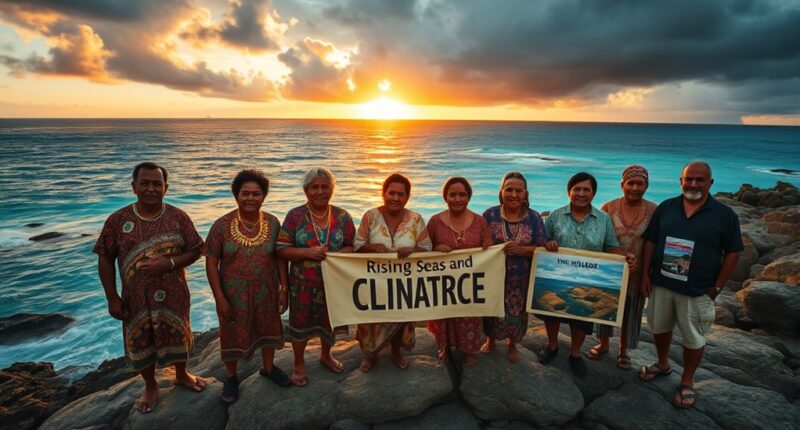You take action by bringing your climate case to the UN because you want to hold governments accountable for failing to protect your community from climate change’s impacts. Your goal is to raise international awareness and ensure your rights are acknowledged under global law. By going to the UN, you aim to push for justice and stronger protections for Indigenous lands and cultures. If you keep exploring, you’ll discover how this move shapes global efforts to defend Indigenous rights and climate justice.
Key Takeaways
- To challenge government policies threatening Indigenous rights and highlight climate impacts on Torres Strait communities.
- To elevate Indigenous voices on an international platform beyond domestic political limitations.
- To frame climate change as a human rights issue protected under international law.
- To hold governments accountable through legal mechanisms like international arbitration.
- To set a precedent for global Indigenous climate justice and influence international climate policies.

The Torres Strait Eight have taken a bold step by filing a climate case that challenges government policies on climate change and their impact on Indigenous communities. This move isn’t just about environmental concerns; it’s deeply rooted in defending Indigenous rights that are being threatened by rising sea levels and climate-related disasters. As members of the Torres Strait Islands, they understand that their cultural heritage, ancestral lands, and way of life are at risk. By bringing their case to an international platform, they aim to draw global attention to how climate policies—or the lack thereof—disproportionately affect Indigenous peoples. Their decision underscores that climate change isn’t just an environmental issue; it’s also a matter of justice and human rights, which are protected under international law. Recognizing the importance of indigenous sovereignty, they seek to ensure their voices are heard on a global stage. Seeking justice through international arbitration allows the Torres Strait Eight to bypass national political hurdles. They recognize that their government’s policies might fall short in adequately addressing their concerns or respecting their Indigenous rights. International arbitration offers a neutral ground where their grievances can be heard independently, ensuring their voices aren’t drowned out by domestic political interests. This process also emphasizes the importance of upholding international commitments to Indigenous rights, such as those outlined in the United Nations Declaration on the Rights of Indigenous Peoples (UNDRIP). By elevating their case to this level, they’re asserting that climate change impacts on Indigenous communities aren’t just local problems—they’re global issues that require international cooperation and enforceable legal standards.
Their choice to pursue the case via international arbitration signals their determination to hold governments accountable for actions or inactions that jeopardize Indigenous rights. It sends a message that climate justice must be grounded in legal accountability, emphasizing that governments have a duty to protect vulnerable communities under international law. The Torres Strait Eight understand that climate change is a human rights issue, and they’re leveraging international mechanisms to ensure their rights are recognized and protected. This approach highlights the importance of respecting Indigenous sovereignty and ensuring their voices are heard in global climate discussions.
In doing so, they set a precedent for other Indigenous communities worldwide who face similar threats. Their case underscores the need for international bodies to recognize the unique vulnerabilities of Indigenous peoples and to enforce policies that respect their rights and cultural integrity. Ultimately, by taking their climate case to the UN and engaging in international arbitration, the Torres Strait Eight demonstrate that climate justice must be inclusive, legally grounded, and driven by those most affected. It’s a powerful reminder that climate change isn’t just an environmental crisis but a human rights challenge demanding global action and respect for Indigenous sovereignty.
Frequently Asked Questions
How Does Climate Change Specifically Threaten Torres Strait Communities?
You’re directly affected by climate change as sea level rise threatens your homes and land. This not only puts your community at risk of flooding but also causes cultural erosion, as sacred sites and traditions vanish. The changing climate disrupts your way of life, making it harder to maintain your heritage and connection to the land. It’s a urgent call to protect your community from these escalating environmental threats.
What Legal Precedents Exist for Indigenous Climate Litigation at the UN?
Like a trailblazer carving through untouched snow, you see that legal precedents for indigenous climate litigation at the UN are still emerging. Cases like the Juliana v. United States set important groundwork, emphasizing indigenous rights and environmental protection. These precedents help strengthen your argument that climate change threatens indigenous communities, making it essential to push for stronger legal recognition of their rights and climate justice at international levels.
How Has the Australian Government Responded to the Torres Strait Eight’s Case?
You see that the Australian government’s policy response has been cautious, emphasizing sovereignty and economic concerns rather than direct action. They’ve engaged in diplomatic negotiations, often downplaying the case’s significance while resisting international pressure. The government claims they’re committed to climate policies but haven’t committed to specific measures addressing the Torres Strait Eight’s concerns, showing a focus on maintaining national interests over urgent climate justice demands.
What International Laws Support Indigenous Rights in Climate Cases?
You see that international laws support Indigenous sovereignty and climate justice. International treaties like the UN Declaration on the Rights of Indigenous Peoples affirm your right to protect your land and culture. These treaties recognize your sovereignty and emphasize your role in climate decisions affecting your community. By invoking these laws, you’re asserting your rights on a global stage, demanding that governments respect and uphold your cultural and environmental interests.
What Are the Potential Global Impacts of This Climate Legal Action?
Imagine a ripple spreading across oceans, shaping climate diplomacy worldwide. Your actions in this case could ignite a global conversation on justice, forcing nations to reevaluate their climate policies. This legal challenge could set a precedent, inspiring other indigenous communities to seek justice internationally. In turn, it pushes for stronger commitments to climate action, fostering a more equitable and sustainable future, and reshaping global justice on climate issues.
Conclusion
By taking their climate case to the UN, you’re witnessing a fight that’s bigger than just a small community—it’s a battle for the very future of humanity. Your voice can’t be ignored when lives and lands hang in the balance. The Torres Strait Eight show that even in the face of overwhelming odds, hope is a powerful force. If this doesn’t inspire you to stand up for climate justice, nothing will—because this is a fight for the world’s soul.









